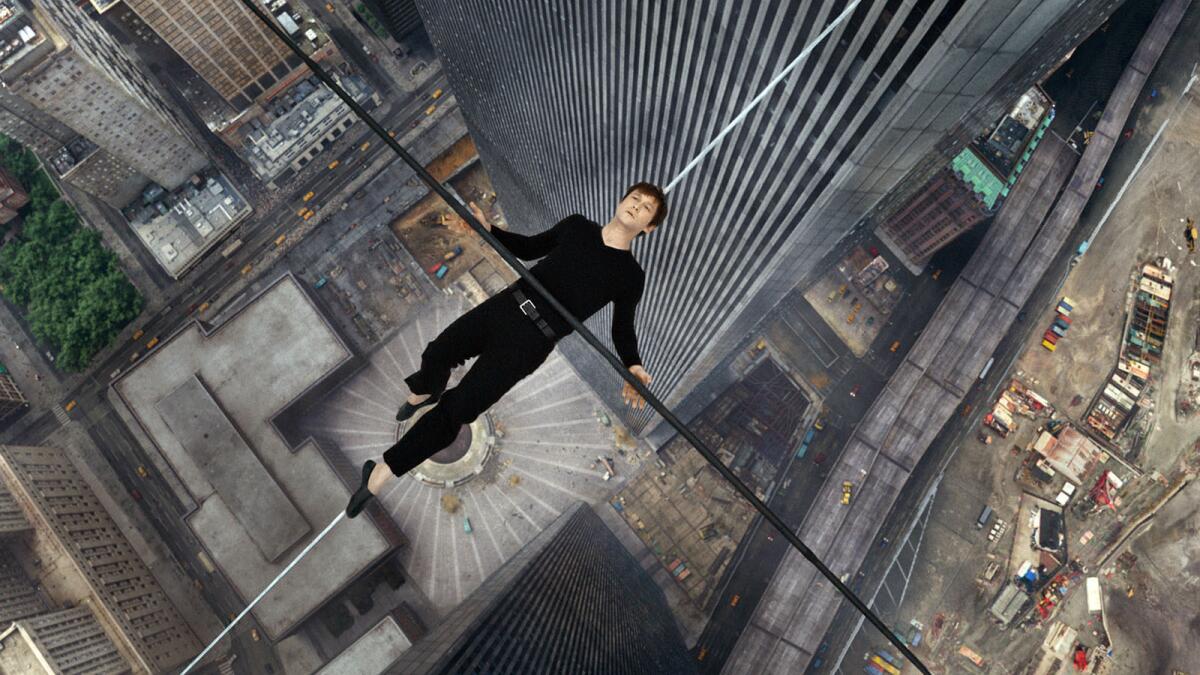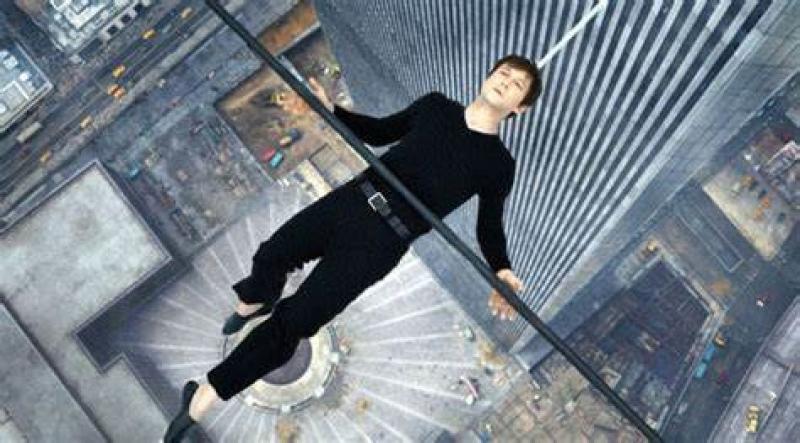How 'The Walk' came into existence
By: Steven Zeitchik (Los Angeles Times)

How 'The Walk' came into existence

Joseph Gordon-Levitt portrays Philippe Petite in a scene from, "The Walk."
Robert Zemeckis isn't necessarily willing to spill all the technical secrets of how he made "The Walk," his new movie about Philippe Petit and the Twin Towers that brings the building to life, with us atop them. And let's be honest -- the nitty-gritty of frame rate and digital-animation techniques might be a little mystery-diluting anyway.
But how "The Walk" came to be, in a larger sense, is a more decipherable puzzle. It contains jigsaw pieces that would not be easy to procure in the first place, let alone fit together: a director with an obsessive streak, a studio executive willing to roll the dice on bold material (at the right price), an actor who wanted to tackle the challenge (with the right accent), a building and subject laden with the stuff of fable.
With "The Walk" now open in theaters, in its Joseph Gordon-Levitt and IMAX 3-D glory, here's a look at the elements of the film and how they came together.
T he production. While it seems to be arriving well after that Philippe Petit renaissance that arose in the wake of James Marsh's 2008 documentary "Man on Wire," Zemeckis was actually interested in turning Petit's story into a movie a few years before that, when he read Mordicai Gerstein's 2003 picture book "The Man Who Walked Between the Towers." He soon flew Petit, who lives in upstate New York, to meet him in Southern California. The two dined, and Zemeckis sold him on the idea that a scripted movie was the right way to go (without Petit playing himself, an early notion floated by the lens-loving wire-walker). "Everything about the story -- the courage Philippe had, the bigger-than-life adventure -- struck me as surprising," Zemeckis said. "And then to present the passion of this character as this cinematic spectacle -- that's what makes the movies the movies.
The budget. It cost $35 million. Yes, $35 million. That's not a misprint. In an era when even garden-variety action-adventures come in at a high multiple of that, it's an unfathomable number -- one usually associated with mid-budget genre movies, not sky-tickling effects pictures. To get there, producers did a lot of trimming. Production days were slashed; locations tossed aside. (An early thought to shoot in Paris and New York, where the film takes place, was scrapped in favor of rebate-friendly, currency-favorable Montreal.) Zemeckis did his usual fee-waiving thing. The crew worked with Atomic Fiction, a boutique visual effects agency, to make it all look much richer and lusher than most computer-diddled movies do. And a movie that should have cost $100 million went for a third that. "From its original iteration to its actual budget," says "Walk" producer and longtime Zemeckis partner Jack Rapke, "is night and day."
The studio. The project was initially at Disney, when Dick Cook was still running the show there, two regimes ago. A few flops and some management changes changed all that. Gone was Zemeckis' large-scale animation company ImageMovers and the 400 people who worked for it; gone, too, was the Petit passion project. Zemeckis and Rapke extended their hat to every source looking for money -- independent, studio, foreign. No one bit. Zemeckis grew frustrated; the technology, though, was getting better. Zemeckis went and made another movie, the 2012 character drama "Flight," in the interim. Tom Rothman, the longtime head of Fox, went to a gig on the Sony lot in the interim too, running a revived Tri-Star.
Rothman had a history with Zemeckis ("Cast Away," e.g.). And he possessed a willingness to do big, upscale digitally-oriented projects if they could be done very inexpensively. ("Life of Pi," e.g.). He said Sony would make the movie if Zemeckis kept the cost really low. And now the technology had improved to the point that that was at least conceivable. Zemeckis said he'd do it. "It creates a lot of heartbreak when you have a movie that you get everyone excited about and then can't make," the director said. "In the case of 'The Walk,' I'm walking around with this, so to speak, for almost nine years. But I never had that feeling it wasn't going to get made. It's really interesting. I always knew it would see the light of day."
The director. Zemeckis has been telling Hollywood they've been missing something for a while, taking on non-franchise projects others might describe as quixotic. Then he runs into windmills and proves them wrong (mostly). It happened on "Forrest Gump," nearly shut down a few weeks before production began in South Carolina. It happened on "Romancing the Stone," a movie thought to be such a dud that Zemeckis was fired from his next film "Cocoon" after the studio saw an early cut. It happened on "Back to the Future," when Zemeckis insisted Michael J. Fox was the guy even after Eric Stoltz, whom he'd gone to when he couldn't get Fox out of his "Family Ties" deal, had been shooting the film for five weeks.
It's yet to happen on his three motion-capture movies between 2004 and 2009, one of which ("The Polar Express") was a hit and two of which ("A Christmas Carol" and "Beowulf") weren't; the industry and critics still raise their eyebrows on that one. And though the move to "Flight," "Walk" and his next movie -- a World War II romantic thriller starring Brad Pitt and Marion Cotillard -- would suggest Zemeckis has left the mo-cap moment behind, he says he might well return, especially after the technology is perfected in the coming years. Other tech-minded experiments may await too. His friend and old writing partner Bob Gale recently saw "Unfriended," Leo Gabriadze's genre movie told via computer screen. Zemeckis has wanted to do something along those lines, Gale said, and the writer brought it to Zemeckis' attention as a case study for how it might be done. There may be more Dulcineas to come.
The actor. Gordon-Levitt speaks French, has an interest in the circus arts and was also enamored with Petit, whom he met and conducted an intense wire-walking camp with. But it's the accent that may really stand out to filmgoers. Gordon-Levitt said he was nervous before undertaking it. "It was a big swing. A really big swing." But then he thought about Tom Hanks' uppercut in "Forrest Gump" and realized he needed to try it. And Petit really does talk this way -- with a kind of exaggerated lilt that almost builds the swagger into his vocal cadences. So an accent was born. You may still be hearing it long after you see the movie.
The subject. Sometimes you see a movie about a guy, then you see that guy, and they have nothing to do with each other. Hollywood broadens and makes more colorful and all that. That won't happen here. Petit is very much around and, at 66, remains as loquacious and larger-in-life as he is in the film. The screen version may even be toned down. At the New York Film Festival world premiere last weekend, he interpreted a stage shout-out from Zemeckis as a signal to stand at his seat. That is, stand on his seat. Actually, it was the top of the seat, the narrow part that requires some pitching forward and backward to stay balanced, which he did as he waved to the crowd. It might have been a planned bit of stagecraft: the house lights came up as Zemeckis called his name, enabling the audience to see it in full effect. Yes, Petit is very much around.
The audience. Can it actually work? Can a movie that's, at bottom, about one man trying to take a walk draw in millions of moviegoers? Though the on-screen stakes are low, the studio believes it can. "The reason I think it feels important is because dreams are personal," said Rothman, who since production began has come to have more skin in the game -- he now runs Sony's motion pictures unit. The spectacle could help too. "One of the things you have to do when making original movies in this age is give people a reason to get off the couch," Rothman said. "And this does. It's quite simply something you can't get on TV."
The film is going to take its chief competition from "The Martian," Ridley Scott's similarly "man-alone in an otherworldly place adventure" that opens this weekend. That movie will debut to a monster number and keep attracting filmgoers in the weeks to come. "The Walk" must divert some people away, or get them to come to its movie too--building on post-screening word-of-mouth that will be strong but likely also to focus on the walk of the last 30 minutes rather than the entire movie. The studio can, however, rely on the patriotic feeling it stirs: One of its big thematic concerns is what was lost, at least physically, after Sept. 11, 2001.
The building. That leads to the inevitable. Yes, "The Walk" is an ode to the Twin Towers as much as the power of will and ambition, underscored in a melancholic ending suggesting that it's both gone and can live in the imagination. That it's all done seamlessly -- the buildings feel real, not generated on a computer screen -- enhances the effect and makes the loss feel that much more tangible. Which makes sense, as Sept. 11 is what motivated filmmakers to tackle the project in the first place. "If the towers were still here, we would not have made the movie," Rapke said. "Because it has a mythic quality to it. It's almost a fairy tale. There were these beloved towers and now they're not here."
Save that two members besides the Group Administrator have blanket approval to post and promote seeds and articles, all members of this group are welcome to post to the Group seeds, articles and comments provided that: 1) Promotion to the Front (Home) Page of seeds and articles must first be approved by the Group Administrator, and 2) Discussion of politics and/or religion will be limited to the plots and themes of the movies or TV movies and series themselves and any religious comments or proselytizing or commentary concerning current political circumstances not in reference to the movies or TV movies and series themselves will be deleted along with all CoC and ToS violations. As well, anything posted that the administer of this group deems to be offensive or off topic will be deleted. Videos and images that the administrator cannot open must be described in text or they will be deleted.





This may be the first time that I ever posted a movie article about a single movie. I just watched "The Walk" for the first time today, and I thought of it as an amazing movie on different levels. It was a kind of docu-drama of a true story. First of all, the major character is acted by Joseph Gordon-Levitt. My very best friend, who passed many years ago, and who shared a basement apartment with me in London, Ontario, when we were Freshmen at University of Western Ontario, and was one of my partners in my law practice had the surname of Levitt, (not that that would mean anything to anyone else).
What the real-life tightrope walker, Philippe Petit, played by Gordon-Levitt accomplished was truly hard to believe, not only because he was able with his team of helpers to GET to do what he did, but that he actually DID it, something nobody else was ever able to accomplish, and because of 9/11 nobody else will EVER be able to accomplish. He walked a tightrope across the space from the roof of one tower of the World Trade Center to the roof of the other tower of the World Trade Centre, without a safety connection to the wire.
As this movie was produced around 2015, the special effects used made it look real, as you can see in the photo above. As it happens, I'm very uncomfortable with heights, so a lot of the movie at the end made me feel a little nervous, even though I KNEW the height wasn't real. Actually, Gordon-Levitt was really only 12 feet off the ground, but IMO the magic of filmmaking was amazingly successful in this movie. Although the scenes appeared to be in France and New York, the movie was mostly filmed in Montreal. A connection to Montreal is, when the protagonist first meets his female companion, she was singing the late Montrealer Leonard Cohen's "Suzanne", a song that belongs to Montreal and in a way, taking the whole relationship between them, was not unlike the relationship that Leonard Cohen had with the REAL Suzanne. As well, some French is spoken by the characters but it is mostly English.
The movie certainly brought back the feeling of loss in that the towers that were so magnificent at the time of the REAL "walk" by Petit, and my having once been on the observation deck of the WTC myself, it meant something to me that it might not mean to anyone who never was up there. Even though we know that Petit's walk was successful, one can still feel tension watching him walk across for about a half an hour. It wasn't a blockbuster movie, but cost only 35 million dollars to produce it, and its box office was about twice that amount. Nevertheless, it was a pretty job of telling a fantastic story.
I remember aeeing that on the news at the time.
Truly amazing!!!!
He was, of course, charged with multiple offences, and IMO the judge meted out the most just sentence I could imagine - the judge sentenced him to perform his act for free on a much lower rope in Central Park for the benefit of the children in NYC, and I assume his accomplices were sentenced to assisting him in that endeavour.
Some images from the film:
.
.
.
.
.
How the hell did THIS seed stay on the Front (Home) Page so long? Especially with the election a couple days away.
Well it is an unusually interesting article!
If you mean among members of NT, you're being overly generous and optimistic, but of course these days all eyes are on the election, which is why I'll not post any seeds/articles until it's done.
Well it ends Tuesday, after the polls close Tuesday evening. Hopefully we will know the results late Tuesday night-- but it might take longer since it still looks like the race is pretty tight.
(Occasionally I look at polls or election news-- but IMO it still really is "too close to call"),
Actually lately I've been spending too much time online, so I also feel like I need to spend less time online. Will be taking some time off.
I'm totally astounded that it's too close to call. I would have thought that the American people were smart enough and had the ability to discern what was best for themselves and their nation that it would have already appeared to be a landslide. But what I learned when I was a teenager, mixing with American teens at Crystal Beach, Ontario, during summer vacation that the American education system was inferior when compared with ours, and unfortunately it has left too many Americans a few tools short in the toolbox.